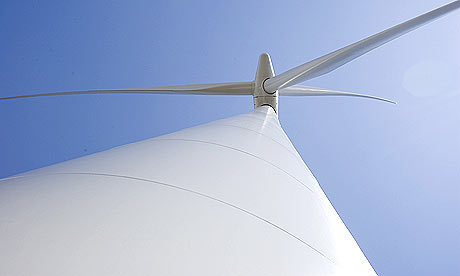
Professor John Gregg at the University of Oxford is an international expert in the fields of spin electronics, spintronics and magnetic instrumentation. But he has designed and built something for homeowners facing high energy costs: a new-generation wind turbine. He is testing the turbine, which features a standard induction motor as a generator, in his mother's garden in Ireland.
It all started thanks to rising energy prices. "About five years ago, the prices got so bad that we agreed we needed a wind turbine to heat the water for the shower," says Gregg. He was "knocked sideways" to find he would have to pay ¤38,000 (£33,000), giving an unrealistic 50-year payback time.
One problem, of course, is the wind. Velocities drop dramatically as you come down in height, and planning laws – though thanks to Irish MP Dick Roche, Ireland has good exemptions for domestic wind turbines – make it difficult to erect tall wind turbines in gardens. The high costs are attributable to custom-built generators, invertors, storage batteries and complex circuitry.
Wind of change
AbuBakr Bahaj, professor of sustainable energy at the University of Southampton, has been undertaking the data analysis work for the UK national micro-wind trials funded by the Energy Saving Trust. A key issue for prospective wind turbine users is understanding their resources.
"Regardless of whether the wind turbine produces electricity or heat, if the wind resource is poor, the device will perform inadequately," he says. "It is important to consider for a realistically sited micro-wind turbine what the wind resource is, rather than considering performance at for example a 12m/s wind speed [how commercial large-scale turbines are rated] – this is very misleading for micro-wind."
It also comes down to the user's usual source of energy. For example, the home heating oil used in rural areas is more expensive than gas, with 60% of the domestic energy budget being consumed by heating.
"I assume that the market for this device is housing which is not on the national gas network," says Bahaj. "This obviously helps the economics because the heating costs are much higher than normal."
As the world invests in renewable resources, every little counts.
No comments:
Post a Comment